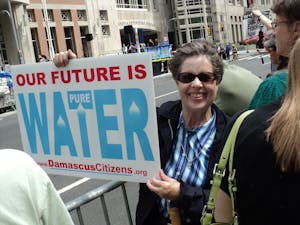Access to Clean Water – A Human Right
And God said, “Let the waters under the sky be gathered together in one place, and let the dry land appear.” God called the dry land Earth, and the waters that were gathered together God called Seas. And God saw that it was good.
To the thirsty I will give water without price from the fountain of the water of life.
We believe that water is sacred and it belongs to Earth and to all life that inhabits our blue planet. Water is recognized by the United Nations as a fundamental human right, yet more than one billion people (one-sixth of the world’s population) lack access to fresh water that is safe for human consumption and 2.4 billion people lack water for basic sanitation. Every day 6,000 children die from diseases associated with lack of access to safe drinking water, inadequate sanitation, and poor hygiene.
We are at a juncture in history where the problem of clean water and access to water has become a global concern. The growing “waterdemic” is related to environmental crisis, public debt, urban population, and the increasing poverty and inequality attributed to policies of trade liberation, privatization, deregulation, and corporate globalization. In an article entitled “Water for All,” the organization Public Citizen tells us that “the International Monetary Fund (IMF), the World bank, and many governments, including the United States, claim that an important way to ensure funding for water services is to raise the price of water to consumers, privatize water, and impose policies called full-cost recovery. In contrast, many consumer-rights and social justice groups say that public funding from governments and international institutions must be the primary source of financing.”
 It is a known fact that governments have increasingly looked at the private sector for capital investment, with strong incentives from the IMF and the World Bank. However, water privatization schemes transform water from a human right into a commodity, available only to those who can afford to pay for it. This leads us to ask the question, “If people can’t afford food, how can they pay for water?”
It is a known fact that governments have increasingly looked at the private sector for capital investment, with strong incentives from the IMF and the World Bank. However, water privatization schemes transform water from a human right into a commodity, available only to those who can afford to pay for it. This leads us to ask the question, “If people can’t afford food, how can they pay for water?”
Across the globe it is evident that water and sewage projects are especially attractive because they guarantee investors a flow of income after construction. This business model serves the high-income sectors well due to the high potential for cost recovery in these areas. Many times those who are the poorest are not even connected to the piped water network. The overriding principle should be the objective of universal access to water and sanitation services. Successful solutions must involve the participation of local citizens, with special emphasis on women’s groups, environmental organizations, consumer groups, shareholder advocacy groups, and others.
Here in the United States, the problem of access to clean water has become a very serious one, as cities need to replace and expand aging and overburdened systems. Congress has been negligent in allocating funds for this purpose. Many Americans have resorted to buying bottled water while ignoring the decaying conditions of public water systems. The water bottling industry profits from the sale of this common resource at the expense of the environment. Scientific studies indicate that pumping can dry out springs, destroy habitats, devastate ecosystems, and drain aquifers.
Presently, we are working with members of the Interfaith Center on Corporate Responsibility on this issue. We have questioned Coca-Cola, Pepsi, and Nestlé about their environmental practices. In particular, we have asked Coca-Cola if they have actually drained aquifers in India. Coca-Cola claims that this is not true but human rights groups are still not satisfied with the answer.
What can you do?
It is important to tell your congress persons to support public water infrastructure funding.
- Visit Public Citizen at www.wateractivist.org to find out “Who Owns Your Water” and to get more information on how you can keep your water from being privatized.
- Read “The Global Water Crisis,” ICCR Corporate Examiner, Vol. 10, December 6, 2004.
- Thirst is a new movie about community resistance to global water privatization. It is being screened across the United States in a campaign to educate and mobilize people to defend the global commons. See the movie; join the campaign!
For more information about Corporate Social Responsibility, contact us.







